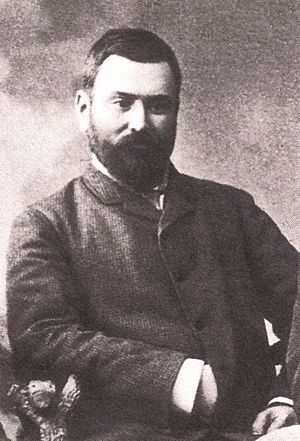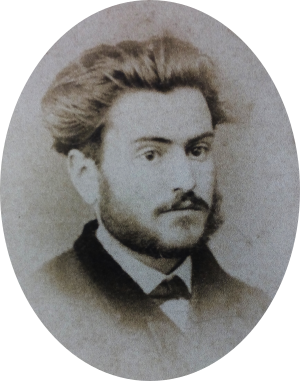Joaquim Pedro de Oliveira Martins facts for kids
Quick facts for kids
Joaquim Pedro de Oliveira Martins
|
|
|---|---|
 |
|
| Born | 30 April 1845 |
| Died | 24 August 1894 (aged 49) Lisbon, Portugal
|
| Nationality | Portuguese |
| Occupation | Politician, social cientist |
Joaquim Pedro de Oliveira Martins (born April 30, 1845 – died August 24, 1894) was an important Portuguese figure. He was a politician (someone who works in government) and a social scientist (someone who studies how people live in groups).
He was also a writer and served as a deputy (like a member of parliament). He even became a minister, handling money matters for the country as the 47th Minister for Treasury Affairs in 1892.
Oliveira Martins was born and passed away in Lisbon, Portugal. His parents were Francisco Cândido Gonçalves Martins and Maria Henriqueta de Morais Gomes de Oliveira.
Many people see Oliveira Martins as a key person in the modern history of Portugal. His ideas and writings had a big impact on many writers who came after him, like António Sérgio, António Sardinha, and Eduardo Lourenço.
He married Vitória Mascarenhas Barbosa in 1865, but they did not have children. His great-nephew, Guilherme de Oliveira Martins, also became a Minister of Finance.
Contents
Oliveira Martins' Early Life and Career
Oliveira Martins had a tough start. He lost his parents and did not finish high school. He had planned to become a military engineer.
From 1858 to 1870, he worked as a businessman. However, his company went bankrupt. After that, he managed a mine in Andalusia, a region in Spain.
In 1874, Martins returned to Portugal. He helped manage the building of a railway line connecting Porto, Póvoa do Varzim, and Vila Nova de Famalicão.
In 1880, he became the president of a group called the Sociedade de Geografia Comercial in Porto. Four years later, he managed the Museum of Industry and Commerce in the same city. He also managed the Company of Mozambique and was part of a group for the Portuguese Industrial Exhibition.
His Political Journey
Oliveira Martins became a deputy (a representative in the government) in 1883 for Viana do Castelo. Later, in 1889, he was elected as a deputy for Porto. In 1893, he became the vice-president of the Junta de Crédito Público, a public credit board.
He was one of the main figures of the "70s generation." This was a group of important writers and thinkers like Antero de Quental, Eça de Queirós, Ramalho Ortigão, and Guerra Junqueiro. Martins was influenced by many different ideas from his time.
What Oliveira Martins Wrote
Oliveira Martins wrote for many important Portuguese newspapers and magazines. His first major work was a novel called Febo Moniz in 1867.
In the area of social sciences, which studies human society, his main books include Elementos de Antropologia (1880), Regime das Riquezas (1883), and Tábua de Cronologia (1884).
He also wrote many history books. Some of his most famous historical works are História da Civilização Ibérica and História de Portugal (both from 1879). He also wrote O Brasil e as Colónias Portuguesas (1880), História da República Romana (1885), Os Filhos de D. João I (1891), and A Vida de Nuno Álvares (1893).
His writings had a big impact on Portuguese politics, history writing, and literature. However, his ideas also caused some arguments. For example, some writers thought he was too negative or even not patriotic enough.
Oliveira Martins' Ideas About History
Oliveira Martins had interesting ideas about how history works. He believed that every single event in history is connected to a bigger picture. He thought that what people do (individual actions) and what society does as a whole are linked.
He felt that the history of the Portuguese nation was a series of choices made by important leaders. However, he also believed that these leaders' actions were guided by bigger rules or destiny.
Martins was not sure if there could be a "science of universal history" with strict laws. He preferred to teach about the order of events (chronology) and the meaning behind history (philosophy of history). He also didn't like historical novels, which mix facts with made-up stories. He preferred clear, factual history.
His ideas were quite new for his time. In the late 1800s, many people thought history should be studied like a science, with clear rules.
Oliveira Martins was greatly influenced by the German historian Theodor Mommsen. Mommsen believed in the importance of the hero – a person who truly represents the spirit of a nation at a certain time. Martins also saw the hero as someone who shows the collective feelings and goals of a nation. In his later works, he focused more on the role of individuals in history.
See also
 In Spanish: Joaquim Pedro de Oliveira Martins para niños
In Spanish: Joaquim Pedro de Oliveira Martins para niños
 | Victor J. Glover |
 | Yvonne Cagle |
 | Jeanette Epps |
 | Bernard A. Harris Jr. |


